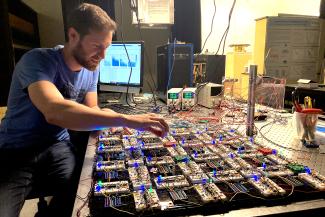
Sam Dillavou, a postdoc in the Durian Research Group in the School of Arts & Sciences, built the components of this contrastive local learning network, an analog system that is fast, low-power, scalable, and able to learn nonlinear tasks. (Image: Erica Moser)
Penn physics and engineering researchers have created a local learning network that is fast, low-power, and scalable.
Read full article here
